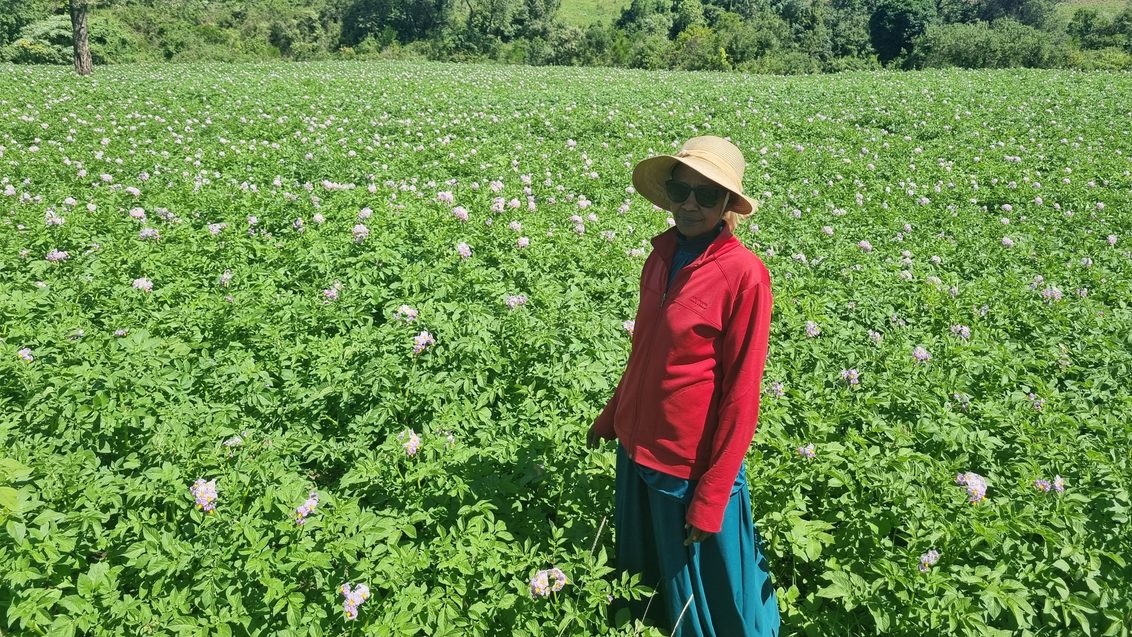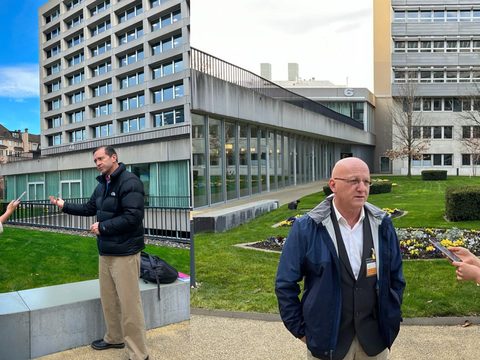Meeting Potato Farmers' Quality Seed Needs

An important step for Kenyan potato farming
In an advancement towards agricultural sustainability, our Seeds2B team in Kenya is joining forces with the National Agricultural Research System (NARS) and dedicated seed merchants. Our collective mission? To significantly increase the availability of certified seed potatoes for smallholder farmers.
The hard work has yielded positive results: increased production, progress towards sustainability, and a new generation of empowered seed entrepreneurs with a bright future.
Take the story of Susan Yiapan, a smallholder from Narok County, whose phone has been buzzing non-stop with orders for her certified potato seeds. Covering 4.5 acres, with a total yield of 36 metric tons, Susan has sold 19 metric tons of her harvest and has a waiting list for her basic seeds. Her success is a testament to the soaring demand for quality potato seeds in Kenya. She sees the need for mechanization and modern storage facilities to prevent post-harvest losses with the expansion of her business.
Susan is among the pioneering farmers who have completed specialized training in certified seed production entrepreneurship, a program born from the collaboration between the Kenya Agricultural and Livestock Research Organisation (KALRO) and our Seeds2B initiative. Stephen Okeyo, our Monitoring & Evaluation Officer, emphasizes that this training is a cornerstone for a sustainable future that benefits everyone in the food supply chain.
The Importance of Early-Generation Seeds (EGS)
High-quality EGS is vital for sustainable agriculture, influencing both crop quality and yield. In Kenya, the prevalence of low-yielding potato varieties has led to disease-prone crops that fail to meet the evolving needs of consumers and processors. However, high-yielding, disease-resistant varieties like Shangi and Unica hold the promise of bolstering Kenya's food security. The challenge lies in the limited EGS supply, which restricts the availability of certified seeds for growers and producers.
Pathway to Enhanced Food Security
The PASTTA (Partnership for Seed Technology Transfer in Africa) project is tackling this issue head-on. KALRO is committed to enhancing the potato value chain through a research-driven approach to developing technologies and knowledge. PASTTA's strategy includes accelerating EGS multiplication, boosting field seed production, and improving seed grower training.
Since 2020, a three-phase plan has been underway, starting with infrastructure upgrades essential for potato production, including a hydroponic greenhouse and a tissue culture lab. These enhancements have paved the way for producing in vitro plantlets and certified seeds. The project's current phase is focused on recruiting and training seed entrepreneurs.
Empowering Seed Entrepreneurs
The Seeds2B initiative has been a game-changer in the field of certified seed production, thanks to the tireless efforts of Manasseh Githinji, our program manager, and Patrick Mutua, our project officer. This program has been instrumental in providing comprehensive training to around 35 aspiring entrepreneurs hailing from the prime potato-producing regions. The curriculum includes crucial good agricultural practices and highlights the vital role of plant health measures. This valuable education has enabled these merchants to successfully produce and market more than 100 metric tons of potato seed, thereby enhancing their income and expanding the availability of certified seeds in multiple counties. The Seeds2B program has been a boon for the entire agricultural community, empowering farmers to achieve greater success and prosperity.
The training includes good agricultural practices and an understanding of the importance of phytosanitary applications. Participants learn how to collect soil samples correctly for testing and analysis. That is a requirement for certified seed multiplication.
Manasseh Githinji, program manager
The trained licensed seed merchants have so far produced and commercialized well over 100 metric tons of potato seed. “That has generated a turnover of about $50,000”, estimates Mutua. “It has also significantly increased farmers’ access to certified seed in numerous potato-growing counties.”
Closing the Seed Gap
Reflecting on the overwhelming demand for her seeds, Susan Yiapan acknowledges the vast market potential and the need for support to close the seed availability gap. Dr. Susan Otieno, a potato breeder and trainer, and the Principal Investigator in the KALRO partnership, echoes this sentiment. She underscores the importance of leveraging the expertise of trained farmers in certified seed production and points to the collaboration between our Foundation and KALRO as a catalyst for enduring positive change for Kenya's smallholder potato farmers.

